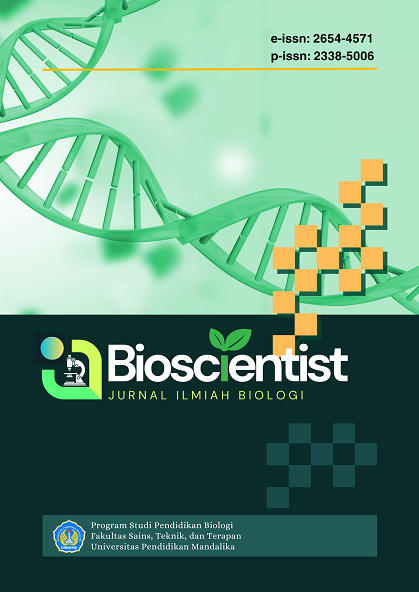Uji Cemaran Mikroba pada Jajanan Pedagang Kaki Lima Sekolah Dasar di Kecamatan Tarakan Tengah Menggunakan Metode Angka Lempeng Total
DOI:
https://doi.org/10.33394/bioscientist.v13i1.15026Keywords:
jajanan kaki lima, angka lempeng total, keamanan pangan, mikrobiologi panganAbstract
This study aims to evaluate the level of microbial contamination in street food sold and to conduct direct observations on environmental sanitation and hygiene practices carried out by street vendors in elementary school environments in Kecamatan Tarakan Tengah. The microbial contamination levels in 15 research samples, consisting of 9 types of food and 6 types of beverages, were randomly obtained from five different sub-districts and measured using the Total Plate Count (TPC) method. During the sampling process, observations and documentation of activities and conditions around the sales locations were conducted. The results of this study indicate that (1) all samples had TPC values far exceeding the limits set by BPOM, with the highest contamination found in pentol ayam goreng (8.69 × 10¹ⰠCFU/g) and es nutrijel stroberi (4.79 × 10¹ⰠCFU/ml); (2) The main factors contributing to the high microbial contamination, based on direct observations during sampling, include poor sanitation practices, exposure to an open environment, and the use of unhygienic equipment. Therefore, it can be concluded that street food sold in the vicinity of elementary schools in Kecamatan Tarakan Tengah presents a significant health risk to students due to the high level of microbial contamination.
References
Almasari, U.-, & Prasasti, C. I. (2019). Food Handlers Personal Hygiene in The Cafeteria of SDN Model and its impacts on Total Plate Count (TPC) in Food. Jurnal Kesehatan Lingkungan, 11(3). https://doi.org/10.20473/jkl.v11i3.2019.252-258
Alves, A., Viveiros, C., Lopes, J., Nogueira, A., Pires, B., Afonso, A. F., & Teixeira, C. (2021). Microbiological Contamination in Different Food Service Units Associated with Food Handling. Applied Sciences, 11(16). https://doi.org/10.3390/app11167241
Barua, P., Banik, K. S., Saha, S., Rahman Jamee, A., Tabassum Trina, A., & Musa, S. (2024). Risk factors associated with street food consumption in Dhaka city due to faeco-oral parasitic infection in food vendors. Food and Humanity, 3, 100441. https://doi.org/10.1016/j.foohum.2024.100441
BPOM, R. (2019). PerBPOM_No_13_Tahun_2019_tentang_Batas_Maksimal_Cemaran_Mikrobiologi.pdf. https://standarpangan.pom.go.id/dokumen/peraturan/2019/PerBPOM_No_13_Tahun_2019_tentang_Batas_Maksimal_Cemaran_Mikrobiologi.pdf?utm_source=chatgpt.com
Girma, F., Yazew, T., Bedada, D., Daba, A., & Kuyu, C. G. (2024). Food hygienic practices and associated factors among street food vendors in Bishoftu town, central Ethiopia. Heliyon, 10(24), e40938. https://doi.org/10.1016/j.heliyon.2024.e40938
Maghfiroh, L., Estoepangestie, A. T. S., Nurhajati, T., Harijani, N., Effendi, M. H., & Handijatno, D. (2021). Total plate count of commercial pasteurized milk sold by street vendors in Mulyorejo sub-district Surabaya. Journal of Halal Product and Research, 4(2), 65. https://doi.org/10.20473/jhpr.vol.4-issue.2.65-70
Makwana, D., Engineer, P., Dabhi, A., & Chudasama, H. (2023). (PDF) Sampling Methods in Research: A Review. ResearchGate. https://www.researchgate.net/publication/371985656_Sampling_Methods_in_Research_A_Review
Miranti, M. G., Handajani, S., Pangesthi, L. T., Astuti, N., Bahar, A., & Widagdo, A. K. (2022). Education on Sanitation and Hygiene Knowledge on Food Vendors in Semolowaru Culinary Tourism Center (CTC) Surabaya. Jurnal Pemberdayaan Masyarakat Madani (JPMM), 6(2). https://doi.org/10.21009/JPMM.006.2.10
Moges, M., Rodland, E. K., & Argaw, A. (2024). Sanitary condition and hygienic practice of street food vendors in selected towns of Ethiopia: A cross-sectional study addressing public health concern. Journal of Agriculture and Food Research, 15, 100857. https://doi.org/10.1016/j.jafr.2023.100857
Moloi, M., Lenetha, G. G., & Malebo, N. J. (2021). Microbial levels on street foods and food preparation surfaces in Mangaung Metropolitan Municipality. Health SA Gesondheid, 26(0). https://doi.org/10.4102/hsag.v26i0.1407
Origenes, R. W., & Espinosa-Gelisanga, R. (2022). Street Food’s Microbiological Load and Vendors’ Food Hygiene and Safety Practices.
Riyanto, A., Murwani, R., Rahfiludin, M. Z., & Megasari, M. (2018). Food Preparation Safety Education Of Street Food Vendors Around Public Elementary Schools To Improve Bacteriological And Chemical Food Safety. Southeast Asian J Trop Med Public Health, 49(2).
Safitri, Y. D., Widodo, W. T., & Azizah, Y. D. N. (2023). Analysis Of Bacterial Contamination By Total Plate Number (ALT) Method In Smoked Fish At One Of The Market Traders: Medicra (Journal of Medical Laboratory Science/Technology), 6(2). https://doi.org/10.21070/medicra.v6i2.1723
Tran, T., Dat, V. H., Phuong, V. N., Tu, T. H. C., Duong, D. V., & Loc, H. H. (2024). Assessing urban street food safety among youth: The impact of road dust on potential microbial contamination risks to student health. Microbial Risk Analysis, 27–28, 100327. https://doi.org/10.1016/j.mran.2024.100327
Valero, A., RodrÃguez, M.-Y., DenissePosada-Izquierdo, G., Pérez-RodrÃguez, F., GarcÃa-Gimeno, E. C. and R. M., Valero, A., RodrÃguez, M.-Y., DenissePosada-Izquierdo, G., Pérez-RodrÃguez, F., & GarcÃa-Gimeno, E. C. and R. M. (2016). Risk Factors Influencing Microbial Contamination in Food Service Centers. In Significance, Prevention and Control of Food Related Diseases. IntechOpen. https://doi.org/10.5772/63029
Were, L., Were, G., & Aduol, K. O. (2020). Hygiene Practices and Microbial Contamination of Street-vended Foods in Kenyatta University’s Environs. European Journal of Agriculture and Food Sciences, 2(5). https://doi.org/10.24018/ejfood.2020.2.5.105
WHO. (2024). Mengelola Keamanan Pangan di Pasar Tradisional: WHO Menguji Coba Strategi Lima Kunci untuk Meningkatkan Standar Kebersihan dan Sanitasi. https://www.who.int/indonesia/id/news/detail/24-06-2024-managing-food-safety-in-traditional-food-markets--who-pilots-five-keys-strategy-to-raise-hygiene-and-sanitation-standards













